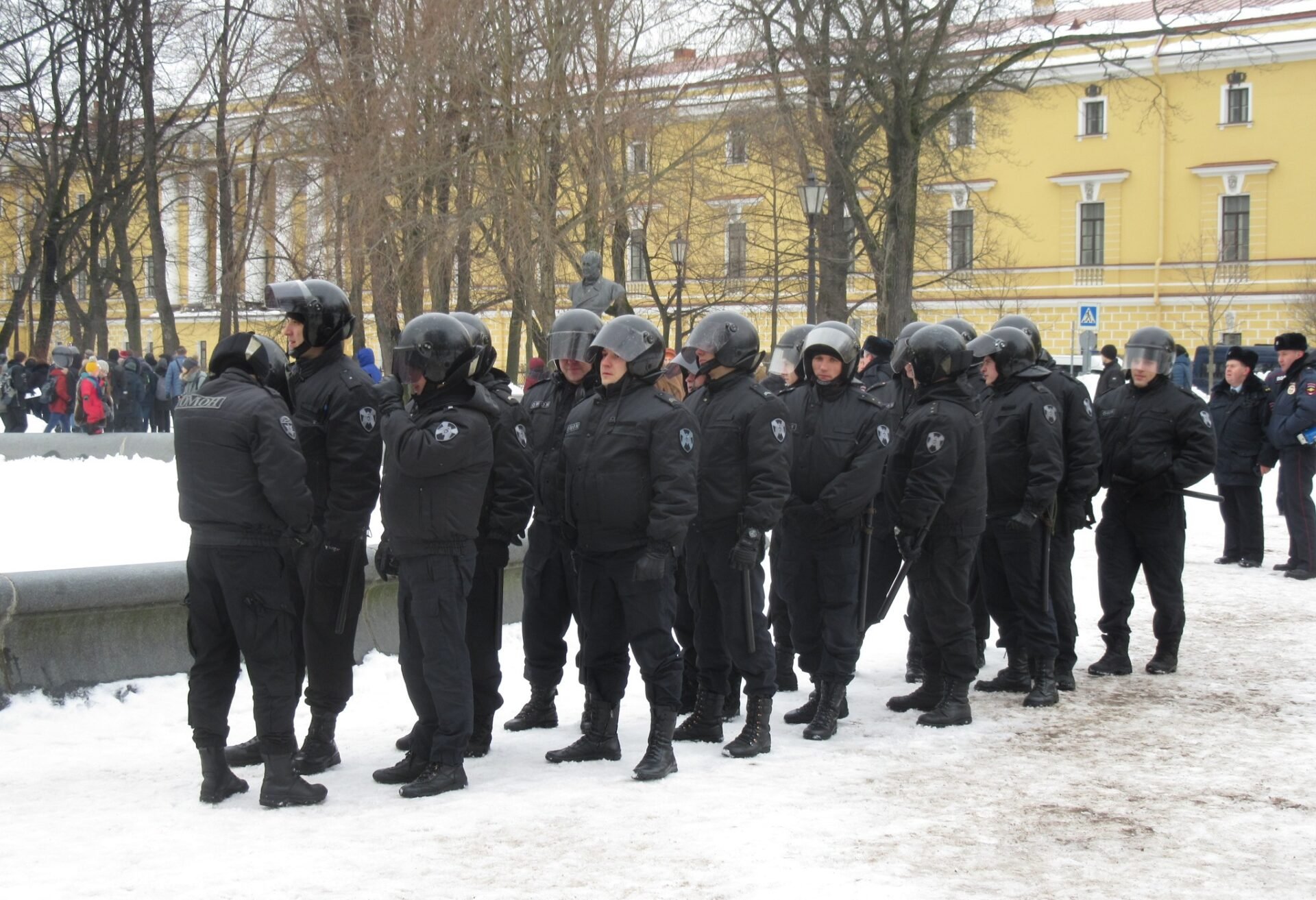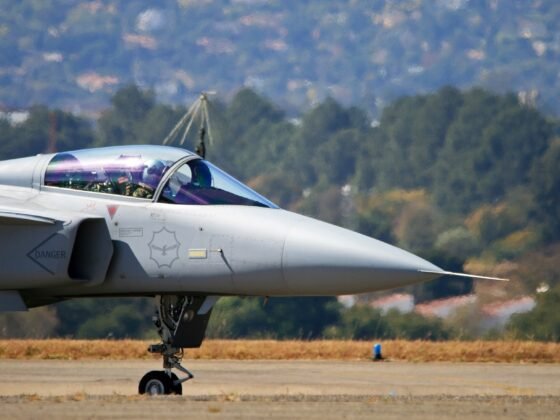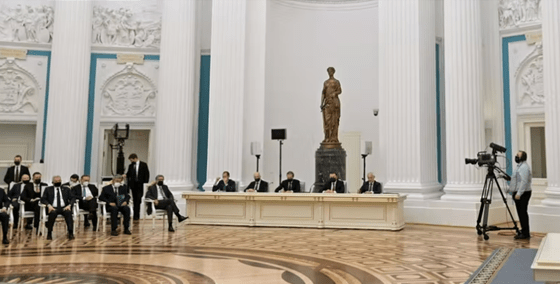Russia’s invasion of Ukraine has set a series of events in motion, from which there is no return, least of all for President Vladimir Putin. For years, he has been preoccupied with his personal legacy. This includes his definition of what constitutes Russian national interests and the protection of them—one of the flimsy pretexts for the recent ground incursions into Ukraine. But now, embroiled in an inevitably messy conflict and amid nascent protests in Russia against the war, maintaining a reliable security service at his disposal will be vital. This, alongside burgeoning internal pressures, including an economy bending under the weight of fresh U.S. and EU sanctions, will mean that when the authorities’ social contract with its people inevitably wears thin, a supportive security force will be vital in maintaining public order. But there is already growing evidence that the security forces’ obedience to the Kremlin is waning.
Could it be that Russia’s key security services, designed to restore order and quash protests, are themselves not under control at a time when Putin needs them the most? Since Putin’s resumption of the presidency in 2018, there have been increasing numbers of former and serving security service members that have publicly criticized the government for presiding over abuses of power, violent hazing rituals, and suicides. While in themselves these acts are nothing new, the absence of an official and functional complaints department has resulted in the use of social media to document and amplify these claims.
Maintaining Order
Putin has a range of security services at his disposal, including his own bodyguard service (FSO), the army, riot police (OMON), the Federal Security Services (FSB, domestic intelligence), the police force, and the National Guard (Rosgvardia). These are all services that, among other functions, help the Kremlin to maintain order or quell protest action, particularly around elections.
Russian society has gradually become more securitized. The Kremlin has moved to further restrict the online and offline activities of its opponents. It has silenced the media that document the corrupt practices of senior public officials and has intervened ever more overtly into electoral processes to ensure a favorable outcome for the ruling United Russia (UR) party. With the opposition stymied, the September 2021 regional elections showed comfortable wins for UR across the board with few staffing changes, allowing Putin to focus on political stability.
Russia’s steady securitization has been matched by a concomitant increase in state spending on internal security, but this has not been reflected in the security services’ salaries or improvements to their working conditions. There seem to be cracks appearing in the security apparatus, with increasing complaints, suicides, and reports of violence. Low pay, long hours, and poor pension plans, alongside more general claims of abuses of office, are common complaints across all of the security agencies.
Who You Gonna Call?
In the absence of an official complaints body, security officers are often forced to turn to social media to express their concerns, which has created a publicly available body of information about their treatment. One of the most unusual occurred in April 2019, when a group of veteran OMON officers posted a video to YouTube personally addressing Putin and appealing for his help in increasing their pensions. The officers requested government housing upon completion of their service, from which they are routinely evicted when they retire. Amongst others, the video made mention of the officers’ distinguished roles in suppressing protest movements during the 2012 elections, which saw Putin resume the presidency for a third consecutive term in office. But their years of long service apparently counted for little.
To meet this demand for registering complaints, a social media platform known as the Police Ombudsman was set up by a former police officer in 2017. This is a semi-formal group on the Russian networking site VKontakte, in which officers exchange views, report instances of abuse, and amass and distribute statistics to this end. The Ombudsman also hosts a Telegram channel, and in 2017 one of the most attention-grabbing posts related to huge bonuses for office support workers said to be well-connected to Kremlin insiders (and un-fireable) but who have no link to police work. The Ombudsman’s official spokesman and founder, Vladimir Vorontsov, was a police officer for 13 years before he left the service in 2017, launching the Ombudsman service on Vkontakte shortly afterward. It now has a subscription of 300,000 users, many of whom are former and serving officers.
While the authorities seem to have tolerated these pockets of complaints for a brief time, Vorontsov was suddenly slapped with spurious extortion charges in May 2020. He documented the claims against him, maintaining that the operation to search his apartment involved senior detectives normally assigned to cases of the highest importance, even though the crimes he is accused carries a sentence of no more than two years in prison. This might seem like an overreaction from the police force, but it could also suggest that the Ministry of the Interior—under whose auspices the police operate —views the growing complaints against its system as a potential threat. Although the Ombudsman channel has not yet been formally shut down, fears of similar reprisals would likely deter other officers from picking up Vorontsov’s mantel.
Low salaries and overwork are just some of the complaints, but in the past three years, there has also been a spate of suicides among serving officers across the country, which the Ombudsman initially led the way in reporting. The Ministry of the Interior does not publish official statistics on this, but in 2019 the Ombudsman released tabulated data indicating the suicide rates, showing 50 such incidents in 2018, predominantly in the republic of Bashkortostan with reports of understaffing, overwork, and underpay, details of which are glossed over by the local force.
Under pressure to preserve order during election cycles and ensure an optically smooth platform for UR, officers work long hours, and the continued use of quota-based indicators known as the palochanaya sistema (stick system) forces officers to agree on the number of crimes they have processed, which incentivizes officers to punish civilians. Increasingly, interviews with disgruntled officers are surfacing in local media—which rarely make national headlines—who have been forced to turn to journalism to highlight their plight. Most recently, in February 2022, Major Alexander Malygin, with 20 years of service on the police force in the central coal-mining region of the Kuzbass, gave an interview to a local news outlet in which he outlined issues such as unmanageable bureaucracy, abuses of office, backlogs of cases, and an emphasis on creating paperwork rather than solving crime.
Tackling Hazing
The situation among other Russian security services does not appear to be much more promising. Technically, the army is highly regarded by Russians. According to research published in September 2020 by the independent Levada Center polling agency, the army is the most trusted institution in Russia (66 percent), even more so than the president himself (58 percent), the FSB (53 percent), and the police (just 36 percent ).
But reports of violent hazing rituals known as dedovshchina, in which senior officers purposefully target new recruits, have for years been widely publicized on social media outlets or on occasion by victims’ families. These rituals appear to be more common in remote border postings where there is little oversight from Moscow. But then, in late 2021, a spate of suicides in the army, including an escapee, prompted a deeper public examination of these rituals. Investigative journalists reported increased incidences of hazing, whose cases were acquitted or entirely dismissed, a trend that is growing. In a widely publicized case, in October 2019, a military conscript stationed in the Far Eastern region of Zabaikalye shot eight other officers, wounding two others. Media at the time covered the incident extensively and attributed it to the officer’s experience of violent hazing rituals, although defense officials maintained that he had had a nervous breakdown.
The official response has been to ignore the issue. Minister of Defence Sergei Shoigu has denied there is a systemic problem, dismissing the allegations as isolated incidents of bullying. The slow-moving judicial system officially maintains that convictions for abuse of power, violence, and psychological torture are down, but NGOs report a different picture.
As with the police forces’ complaints, however, and notwithstanding Shoigu’s framing of the problem as an unconnected series of events, it appears that the authorities have had enough. Instead of addressing the problem, increasing wages, reforming the judicial system to process the cases, or improving oversight at military bases, Russia instead has legislated.
The Kremlin has taken formal steps to restrict the dissemination of information about anything to do with military crime, the deployment of the Russian military, and its training. The FSB, in October 2021, published its treatise of topics that would result in foreign agent status should organizations or individuals write about them. The list includes any information about the moral or psychological state of the armed forces—even sharing any discussions about these practices online would be considered a violation of the FSB’s list. Inclusion on the list requires lengthy and regular financial reports to be submitted to the FSB, as well as a prominent standfirst above each article that reiterates their status as a foreign agent, alienating them from potential partners or funders as well as audiences.
The law has already been a successful tool of self-censorship. The Soldiers’ Mothers of St. Petersburg, an NGO established in the 1990s and dedicated to protecting the rights of army conscripts, abruptly announced in October 2021 that it would be ceasing its activities, days after the FSB introduced the new law.
Another new law in March 2019 forbids military personnel from using smartphones or other devices capable of connecting to the internet, which would prevent them from posting details about their military service online. This law was likely a response to the growing number of leaks from soldiers about the movement of military equipment—allowing open-source analysts a much more detailed look at troop movements from geolocation tags. But it was also a direct effort to prevent officers from using their devices to film and document incidents of hazing, which had previously been passed to investigative journalists as evidence.
Cementing His Legacy
The Kremlin’s attempts to stifle dissent in its own security services are in line with a growing trend of repression, from which no one is immune. The 2021 regional elections were noteworthy in that they demonstrated the almost total suppression of political newcomers or oppositionists. Oppositionist Alexei Navalny in previous years had regional offices mushrooming all over Russia, but these were abruptly shut down; he was imprisoned on dubious charges and his colleagues harassed or jailed. Police officers have privately reported that serving officers who “like” or share social media posts about Navalny are immediately dismissed. Protest action around these elections was paltry, unsurprisingly given that earlier in the year, from January-March 2021, 68 percent of protests in Russia were met with a state response, and in many cases, the use of excessive force by the OMON and Rosgvardia, as well as the military police.
Legislation can be a powerful tool in Russia, even when it is selectively applied. The security services’ remit has been expanded—another law was quietly passed in December 2021, which gives law enforcement officers the power to, among others, enter and search citizens’ homes even if the homeowner is not present, abandoning the need for search warrants. While the September elections indicated the importance to Putin of continuity, accompanying legislation days after the election that scrapped term limits for regional governors essentially ensures the same leaders remain in office across the country, with little scope for political change. This also reduces the prospects for political newcomers that Putin may not trust, ensuring that the old guard remains intact.
The stifling of discontent within the security services, punishments for those who express it, and denials that there is a fundamental problem all suggest that Putin cannot afford to be seen to address these issues. In the early years of his presidency, Putin was lauded as a newcomer who brought a semblance of economic equilibrium following the rocky 1990s, as well as quashing the previously volatile North Caucasus republics. But now, amid a new hot war with Ukraine, Putin’s domestic legacy as the guarantor of stability is at risk.
Conclusion
Anti-war demonstrations across the country are likely to be detained or met with violence from riot police—particularly if the protests take on an anti-Putin tone. However, it would be worth noting any hesitancy on the part of these officers to detain civilians, particularly if some of them share similar sentiments around the war. Most pressingly, if Putin is unable to call on the security services to put down anti-war demonstrations, ensure that the opposition remains weak and fractured, and protect him personally, there is a risk of an uneven transition of power in the years to come.
Emily Ferris is a Research Fellow, Russia and Eurasia, at the Royal United Services Institute for Defence and Security Studies (RUSI).











